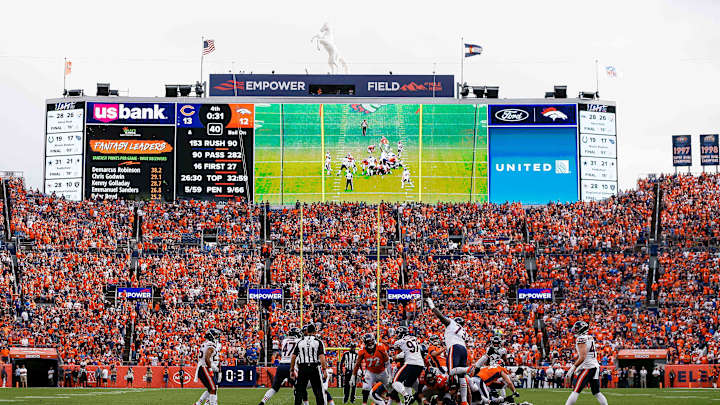Differing Views on Bears' Desired Rule Change

The Bears will need to wait until a May owners vote on rule changes to find out if their proposed alteration goes into effect.
Considering they waited a year and a half to even make the proposal, they shouldn't mind waiting another month or so.
The Bears proposed a change to extra-point rules to make sure all penalties on extra points are enforced, even on successive snaps. They need 24 teams to vote yes to get their wish.
This all stemmed from the comeback win over Denver in 2019 won 16-14 on Eddy Pineiro's 53-yard field goal.
If the situation was such a travesty to require a rule change, it's rather curious the Bears didn't ask for this change last year.
What happened was the Broncos lined up for a two-point conversion after a touchdown to pull within 13-12 with 37 seconds remaining. They committed a delay-of-game penalty and then would have had to line up for the go-ahead two-point conversion from the 7-yard line. The 7 was too far back to go for two, so they chose to kick the extra point for the tie. The extra-point kick was snapped from the 20 instead of the 15 after the penalty, and the tying kick was no good from 38 yards. But wait! Buster Skrine got flagged for offsides.
Under existing rules, Denver was able then to put the ball at the 1 1/2-yard line rather than the 3 1/2, which would have actually been half the distance to the goal line after the delay of game on the previous play. The existing rule wipes out the previous penalty.
So it was as if the 5-yard delay-of-game penalty and the failed conversion pass never existed. Or, in other words, a 5-yard offsides penalty carries more weight than a 5-yard delay-of-game penalty. This quirk is only made possible by the move in 2015 of extra point kicks back to the 15 for the line of scrimmage and two-point tries from the 2. With two different launching points, plenty of silliness is possible.
Denver eventually got the easier two-point conversion, and the Bears drove for the winning field goal as time expired.
The Bears want all extra-point penalties assessed regardless of whether one on defense comes after one on offense.
The old rule sounds unfair on the surface, but there is logic behind not allowing the walk off for the delay penalty and then walking off the offsides from the 2-yard line instead of the 7.
If officials simply penalized the defense half the distance from the 7 one play after an offensive extra-point penalty, it's too far away for a reasonable two-point try from the 3 1/2-yard line. And if they allow for the 5-yard walk off on the extra-point kick, then defenses get an even greater advantage. In essence, defenses could get what amounts to a free play.
The defense could decide to go all out to block the extra point, maybe even jumping offsides or rough the kicker or illegally jumping over blockers at the line of scrimmage because half-the-distance penalties from the 15-yard line or 20 do not bother any defense if they know it's only going to be followed by a re-kick from a little closer.
They might even get the block or get lucky by forcing a wide kick. Or maybe they rough the kicker and get away with no call. Either way, the gamble would be worthwhile considering the half-the-distance walk-off would still leave the offense farther away than the 2-yard line.
Whichever way you look at it, one side is going to be unhappy about how this rule goes.
So, teams favoring offensive teams would tend to oppose the Bears' viewpoint, even if it sounds initially like they were justified.
"It's a unique rule, I'll say that," Bears coach Matt Nagy said at Halas Hall the day after the play happened. "I'm sure they'll look at it. I don't think it happens very often, so now that it happened, maybe they'll check it out.
"They'll get it right."
It's possible they already have, or that there is no right or wrong in this instance and only preference.
Twitter: BearDigest@BearsOnMaven

Gene Chamberlain has covered the Chicago Bears full time as a beat writer since 1994 and prior to this on a part-time basis for 10 years. He covered the Bears as a beat writer for Suburban Chicago Newspapers, the Daily Southtown, Copley News Service and has been a contributor for the Daily Herald, the Associated Press, Bear Report, CBS Sports.com and The Sporting News. He also has worked a prep sports writer for Tribune Newspapers and Sun-Times newspapers.